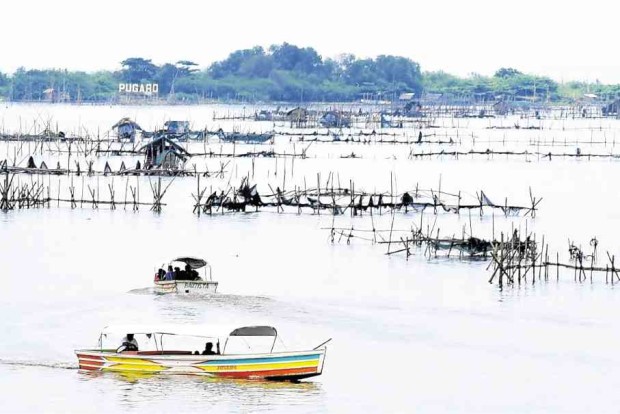
FISH traps and pens built along the Calmay River in Dagupan City have contributed to pollution in the waterway. WILLIE LOMIBAO / Inquirer Northern Luzon
DAGUPAN CITY—An aggressive campaign on illegal fish pens has prevented the release of about 1.8 metric tons of commercial feed to the city’s rivers in the last three years, city agriculturist Emma Molina said on Monday.
Dagupan is crisscrossed by seven rivers. Since July 2013, the city government has dismantled 508 pens that used to operate in a 92.26-hectare area here, Molina said.
The pens, made of bamboo poles and nets staked in the riverbed, are stocked with “bangus” (milkfish), the main aquaculture product of this city.
“Normally, fish stocks consume only 50 percent of the feed. The rest sink to the river bed, becoming a big contributor to the deterioration of the river’s water quality,” said Molina.
The unconsumed feed usually sink to the bottom of the river and rot there, reducing dissolved oxygen levels that could trigger a fish kill, she said.
In 2006, at least P16-million worth of bangus went belly up in a massive fish kill in pens.
Aside from fish feed, poles and nets also impede water flow in the rivers, worsening flooding in the city during monsoon rains, Molina said.
The campaign on illegal fish pens has been intensified because many bangus growers rebuild their facilities, she said.
Only 20 large pens have remained, down from more than 1,000 pens and other fishing structures when the campaign began in 2013, she said.
“We are now focusing on the pens that have encroached on the rivers’ navigational lanes. We have to clear these because these waterways are the island residents’ access to and from the city,” she said.
Maximo Solis, head of a river task force, said it had been difficult for his team to monitor the activities in the city’s waterways because of limited resources.
Pens still operate in the villages of Calmay, Pugaro, Salapingao, Lucao-Tocok and Carael.
Mayor Belen Fernandez had given pen owners until Oct. 30 to harvest their stocks and dismantle their pens, Solis said. Gabriel Cardinoza, Inquirer Northern Luzon